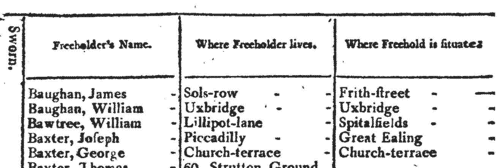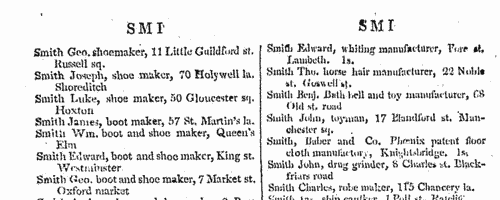Assender Surname Ancestry ResultsOur indexes 1000-1999 include entries for the spelling 'assender'. In the period you have requested, we have the following 9 records (displaying 1 to 9): Buy all | | | Get all 9 records to view, to save and print for £52.00 |
These sample scans are from the original record. You will get scans of the full pages or articles where the surname you searched for has been found. Your web browser may prevent the sample windows from opening; in this case please change your browser settings to allow pop-up windows from this site.  Apprentices registered in Northamptonshire and Warwickshire
(1741-1745) Apprentices registered in Northamptonshire and Warwickshire
(1741-1745)
Apprenticeship indentures and clerks' articles were subject to a 6d or 12d per pound stamp duty: the registers of the payments usually give the master's trade, address, and occupation, and the apprentice's father's name and address, as well as details of the date and length of the apprenticeship. There are central registers for collections of the stamp duty in London, as well as returns from collectors in the provinces. These collectors generally received duty just from their own county, but sometimes from further afield. (The sample entry shown on this scan is taken from a Norfolk return)ASSENDER. Cost: £8.00.  | Sample scan, click to enlarge

| Occupiers of freeholds in Middlesex
(1802)
A poll to elect two knights of the shire to represent the county of Middlesex, was held at Brentford 13 to 29 July 1802. The electors were the adult male freeholders of more than 40s per annum of real estate. This poll book lists the voters alphabetically by surname, giving christian name, abode, where the freehold was situate, the nature of the freehold (such as messuage, house, land, rent-charge &c.), the occupier's name, and whether the freeholder voted for William Mainwaring, George Byng or sir Francis Burdett. The entries are printed across facing pages, of which this sample shows part of a lefthand page. For each name indexed, the matching pair of scans is provided. This is the index to the occupiers, whose names are shown on the righthand pages, sometimes just as a surname, sometimes with christian name or initial.
ASSENDER. Cost: £6.00.  | Sample scan, click to enlarge

| Traders and professionals in London
(1805)
Holden's Triennial Directory for 1805 to 1807 includes this 'London Alphabet of Businesses, Professions, &c.': coverage is good; about 30,000 individuals are recorded.ASSENDER. Cost: £4.00.  | Sample scan, click to enlarge

| Dissolutions of Partnerships
(1838)
Trade partnerships dissolved, or the removal of one partner from a partnership of several traders, in England and Wales
ASSENDER. Cost: £6.00.  | Sample scan, click to enlarge

|  Persons of standing recommending London police recruits
(1830-1842) Persons of standing recommending London police recruits
(1830-1842)
The Metropolitan Police Register of Joiners (MEPO 333/4) lists policemen joining the force through to 31 December 1842 (to warrant number 19892). The register is alphabetical, in so far as the recruits are listed chronologically grouped under first letter of surname. It is evidently a continuation of a similar earlier register, not closed until its alphabetical sections were filled: consequently, there are no entries in this register for the initial letters N, O, Q, U, V, X, Y or Z; and the sections of this register start at different dates - A 18 April 1840 (warrant number 16894); B 11 December 1830 (5570); C 7 September 1830 (4988); D 27 May 1833 (8445); E 15 December 1838 (14476); F 30 March 1832 (7372); G 1 December 1835 (11,184); H 25 April 1832 (7457); I and J 13 February 1837 (12449); K 2 January 1838 (13457); L 3 October 1834 (9905); M 15 November 1832 (7999); P 4 October 1831 (6869); R 4 September 1837 (13021); S 30 March 1835 (10366); T 6 April 1840 (16829); W 30 December 1833 (9096). The register gives Date of Appointment, Name, Number of Warrant, Cause of Removal from Force (resigned, dismissed, promoted or died), and Date of Removal. Those recruits not formerly in the police, the army, or some government department, were required to provide (normally) at least two letters of recommendation from persons of standing, and details of these are entered on the facing pages: the names in these are indexed here (the police recruits are indexed separately and not included here). Recruits transferred from other forces or rejoining the force did not normally need recommendations - in the latter case, former warrant numbers are given - but some recommendations are from police inspectors, even other constables. Recruits coming from the army sometimes have general military certificates of good conduct, but most often have a letter from their former commanding officer; recruits recommended by government departments (most often the Home Office) similarly have letters from the head of department. But the great majority of the names and addresses in these pages are of respectable citizens having some sort of personal acquaintance with the recruit. Where more than two recommendations were provided, the clerk would only record one or two, with the words 'and others'. Tradesmen are sometimes identified as such by their occupations; there are some gentry. Although the great bulk of these names are from London and the home counties, a scattering are from further afield throughout Britain and Ireland. ASSENDER. Cost: £8.00.  | Sample scan, click to enlarge

| Traders and professionals in London
(1851)
The Post Office London Directory for 1851 includes this 'Commercial and Professional Directory', recording about 80,000 individuals. ASSENDER. Cost: £4.00.  | Sample scan, click to enlarge

| Gentry in London
(1856)
The Post Office London Directory for 1856 includes this 'Court Directory', listing alphabetically by surname and christian name the upper class residents of the capital with their postal addresses. 'In order to afford space for the addresses, the abbreviation "esq." for esquire has no longer been appended to each name in the Court Directory. It should be understood that such should be added to the name of every gentleman in the following pages to which no inconsistent addition is affixed.' Decorations, honours &c. are generally given. Some gentlemen appear who are also listed (as professional men, &c.) in the commercial section. Those with second residences in the provinces usually have the country address given as well.ASSENDER. Cost: £4.00.  | Sample scan, click to enlarge

|  Persons of standing recommending London police recruits
(1843-1857) Persons of standing recommending London police recruits
(1843-1857)
The Metropolitan Police Register of Joiners (MEPO 4/334) lists policemen joining the force 1 January 1843 to 1 April 1857 (warrant numbers 19893 to 35804). The register is alphabetical, in so far as the recruits are listed chronologically grouped under first letter of surname. It gives Date of Appointment, Name, Number of Warrant, Cause of Removal from Force (resigned, dismissed, promoted or died), and Date of Removal. Although the register was closed for new entrants at the end of 1842, the details of removals were always recorded, some being twenty or more years later. Those recruits not formerly in the police, the army, or some government department, were required to provide (normally) at least two letters of recommendation from persons of standing, and details of these are entered on the facing pages. Where a recruit was only recently arrived in the metropolis, the names and addresses of the recommenders can be invaluable for tracing where he came from. Those recruits not formerly in the police, the army, or some government department, were required to provide (normally) at least two letters of recommendation from persons of standing, and details of these are entered on the facing pages: the names in these are indexed here (the police recruits are indexed separately and not included here). Recruits transferred from other forces or rejoining the force did not normally need recommendations - in the latter case, former warrant numbers are given - but some recommendations are from police inspectors, even other constables. Recruits coming from the army sometimes have general military certificates of good conduct, but most often have a letter from their former commanding officer; recruits recommended by government departments (most often the Home Office) similarly have letters from the head of department. But the great majority of the names and addresses in these pages are of respectable citizens having some sort of personal acquaintance with the recruit. Where more than two recommendations were provided, the clerk would only record one or two, with the words 'and others'. Tradesmen are sometimes identified as such by their occupations; there are some gentry. Although the bulk of these names are from London and the home counties, a scattering are from further afield throughout Britain and Ireland. ASSENDER. Cost: £8.00.  | Sample scan, click to enlarge

| Missing Next-of-Kin and Heirs-at-Law
(1880)
The Unclaimed Money Registry and Next-of-Kin Advertisement Office of F. H. Dougal & Co., on the Strand in London, published a comprehensive 'Index to Advertisements for Next of Kin, Heirs at Law, Legatees, &c., &c., who have been Advertised for to Claim Money and Property in Great Britain and all Parts of the World; also Annuitants, Shareholders, Intestates, Testators, Missing Friends, Creditors or their Representatives, Claimants, Unclaimed and Reclaimed Dividends and Stock, Citations, Administrations, Rewards for Certificates, Wills, Advertisements, &c., Claims, Unclaimed Balances, Packages, Addresses, Parish Clerks' Notices, Foreign Intestates, &c., &c.' The original list was compiled about 1860, but from materials dating back even into the 18th century: most of the references belong to 1850 to 1880. For each entry only a name is given, sometimes with a placename added in brackets: there may be a reference number, but there is no key by which the original advertisement may be traced. The enquirer of the time had to remit £1 for a 'Full and Authentic Copy of the Original Advertisement, together with name and date of newspaper in which the same appeared'. ASSENDER. Cost: £4.00.  | Sample scan, click to enlarge

|
Research your ancestry, family history, genealogy and one-name study by direct access to original records and archives indexed by surname.
|












